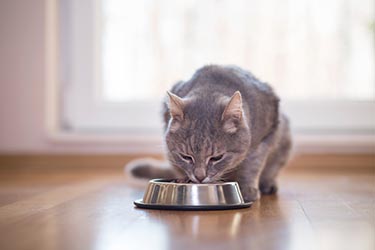Analyzing Pet Diet Trends

Help your clients understand the pros and cons of pet diet trends
Fad diets continue to dominate headlines and everyone has differing opinions about what does or does not work. You may encounter clients who are ready to put their pet on the latest diet, without fully considering the health implications. It might be helpful to remind your clients about some pros and cons of popular pet food trends to ensure they are fully informed and making the best choices for their pets’ health. Remind them that you are always looking out for their pets’ best interests and optimal health, and encourage clients to share their pet nutrition questions with you at each visit.
Raw food diets
Raw food diets continue to spark debate. A web-based survey cited in an article from The Canadian Veterinary Journal shows that more pet owners turned to the Internet, rather than their veterinarian, for diet-related information. In fact, only 8 percent of survey respondents opting to feed raw diets to their pets sought nutrition advice from their veterinarian.
Those in favor of raw diets for dogs and cats argue that they are more natural for pets. This trend comprised 58 percent of the $13 billion pet food specialty market in the U.S. Proponents advocate that raw diets improve skin conditions and allergies due to the elimination of additives or contamination concerns that can be attributed to processed food. Increased energy, improved dental health and smaller stools also are cited as benefits.
The American Veterinary Medical Association, U.S. Food and Drug Administration Center for Veterinary Medicine, the CDC, the American College for Veterinary Nutritionists and the American Animal Hospital Association all have policies or statements against raw diets, particularly regarding the feeding of raw meats or eggs. The risk for bacterial or parasitic contamination for both humans and pets, as well as nutritional imbalances for pets, are among cited reasons. Help your clients understand and evaluate the sources of their information and raw diets recipes before they choose to move forward with this feeding plan.
Grain-free foods and diets
While “grain-free” for humans can indicate anything from gluten-free to paleo, one trend toward grain-free pet food simply moves to eliminate ingredients like corn, wheat and barley from commercially made pet food. Proponents of moving to grain-free foods suggest that elimination of these hard-to-digest complex carbohydrates may lead to decreased digestive issues, food allergies, bowel inflammation disorders, ear infections and skin irritations.
However, it’s important to inform clients that in July 2018, the FDA issued a statement cautioning against grain-free diets as they investigate a potential link with canine dilated cardiomyopathy (DCM). If your clients are convinced they need to make a switch, recommend that they slowly make the transition and opt for choices that feature a protein as the main ingredient. As with any diet change, pet owners should watch for changes in health or behavior, and perhaps specifically for early symptoms of DCM, as their pet moves forward with grain-free feeding.
Ketogenic diets
Ketogenic diets remain one of the hottest current human trends, focusing on a high ratio of fat compared to protein and carbohydrates. The safety of ketogenic diets for dogs also remains a source of debate.
Ketogenic diets have been used to treat human epilepsy since the 1920s, so researchers in the United Kingdom conducted a trial on dogs. The results, published in the British Journal of Nutrition, showed that out of 21 dogs studied in the trial, three became seizure-free, and another seven experienced at least a 50 percent drop in seizure frequency while on the diet. American Veterinarian discusses the trial in more detail. Others are studying the benefit of ketogenic diets in dogs with cancer.
However, ketogenic diets can be problematic for diabetic pets, as veterinarian Dr. Marc Smith says you have to lower morning insulin doses to prevent hypoglycemia. Dogs also face increased risk of pancreatitis with diets high in dairy fats.
All-human food diets
It’s not uncommon to be tempted to drop a bite of dinner into the mouth of a sweetly begging dog or cat. But remind your client that human and pet digestive systems are not created equal. That saucer of milk likely will give Fluffy diarrhea, and raw meat or eggs for Spot could contain Salmonella or E. coli. Nuts can lead to vomiting, diarrhea or pancreatitis, while salty foods can produce excessive thirst, urination or sodium ion poisoning. Consider sharing a list of foods to avoid feeding pets, like this one from the ASPCA or posting the ASPCA Animal Poison Control Center phone number at (888) 426-4435 on your practice website.
No matter what foods or diets you recommend, Covetrus carries a variety of options from the brands veterinarians trust.
Sources:
https://www.ncbi.nlm.nih.gov/pmc/articles/PMC5432139/
http://www.petproductnews.com/News/3-Pet-Food-Trends-to-Watch-in-2019/
https://www.akc.org/expert-advice/vets-corner/feed-my-dog-raw-food-or-dog-kibble/
https://www.avma.org/KB/Resources/FAQs/Pages/Raw-Pet-Foods-and-the-AVMA-Policy-FAQ.aspx
https://veterinaryrecord.bmj.com/content/182/2/50
https://www.caninejournal.com/grain-free-dog-food/
https://www.fda.gov/animalveterinary/newsevents/cvmupdates/ucm613305.htm
https://pettao.com/pet-owners-guide-dog-cancer/
https://pettao.com/benefits-dangers-ketogenic-diet-for-dogs/
https://www.aspca.org/pet-care/animal-poison-control/people-foods-avoid-feeding-your-pets
https://www.aspca.org/pet-care/animal-poison-controlNeed Regulatory Assistance
If you need help with regulatory or licensing issues, we're happy to help. We have a wide variety of resources to help you when issues arise.

Careers
Are you looking for a place to let your talents shine? At Covetrus, we help our practitioner customers better serve their patients and take pride in providing the best customer experience possible. Search our open positions to see our available opportunities.
Newsletter
Stay current with what’s going on with Covetrus, subscribe to receive our newsletter and email communications. Subscribers will receive the latest information in practice management, sales and marketing, animal health, and more.


Leave a comment